英语翻译之词义省略法
英译汉省略译法(2)—省略介词和连词
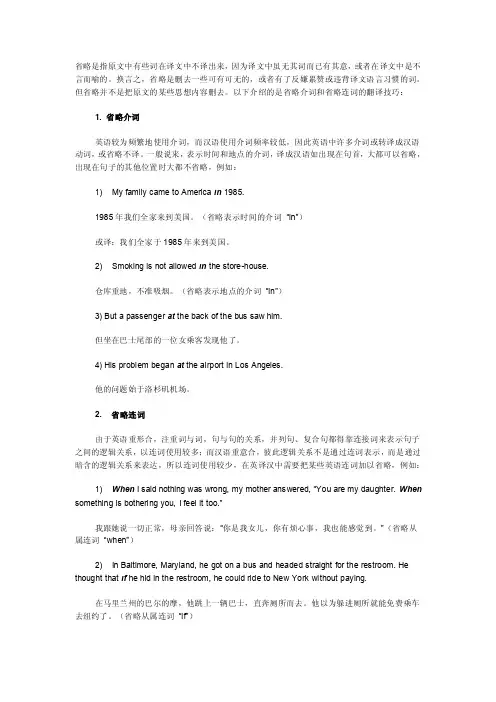
省略是指原文中有些词在译文中不译出来,因为译文中虽无其词而已有其意,或者在译文中是不言而喻的。
换言之,省略是删去一些可有可无的,或者有了反嫌累赘或违背译文语言习惯的词。
但省略并不是把原文的某些思想内容删去。
以下介绍的是省略介词和省略连词的翻译技巧:1. 省略介词英语较为频繁地使用介词,而汉语使用介词频率较低,因此英语中许多介词或转译成汉语动词,或省略不译。
一般说来,表示时间和地点的介词,译成汉语如出现在句首,大都可以省略,出现在句子的其他位置时大都不省略,例如:1) My family came to America in 1985.1985年我们全家来到美国。
(省略表示时间的介词“in”)或译:我们全家于1985年来到美国。
2) Smoking is not allowed in the store-house.仓库重地,不准吸烟。
(省略表示地点的介词“in”)3) But a passenger at the back of the bus saw him.但坐在巴士尾部的一位女乘客发现他了。
4) His problem began at the airport in Los Angeles.他的问题始于洛杉矶机场。
2. 省略连词由于英语重形合,注重词与词,句与句的关系,并列句、复合句都得靠连接词来表示句子之间的逻辑关系,以连词使用较多;而汉语重意合,彼此逻辑关系不是通过连词表示,而是通过暗含的逻辑关系来表达,所以连词使用较少,在英译汉中需要把某些英语连词加以省略,例如:1) When I said nothing was wrong, my mother answered, “You are my daughter. When something is bothering you, I feel it too.”我跟她说一切正常,母亲回答说:“你是我女儿,你有烦心事,我也能感觉到。
”(省略从属连词“when”)2) In Baltimore, Maryland, he got on a bus and headed straight for the restroom. He thought that if he hid in the restroom, he could ride to New York without paying.在马里兰州的巴尔的摩,他跳上一辆巴士,直奔厕所而去。
英语翻译技巧第十节 省略法
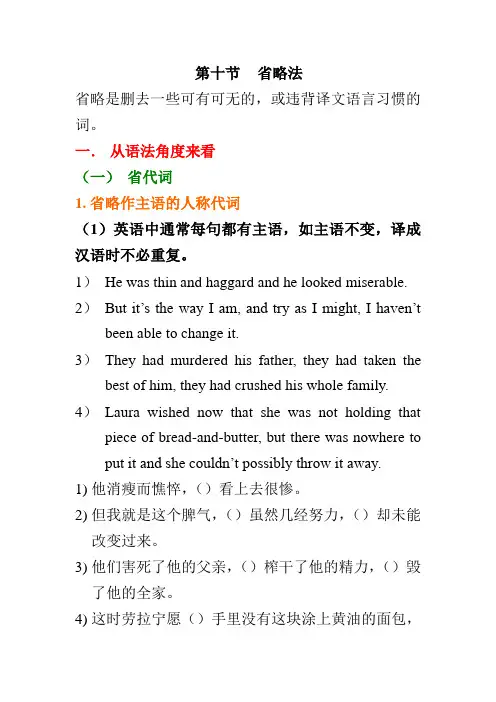
第十节省略法省略是删去一些可有可无的,或违背译文语言习惯的词。
一.从语法角度来看(一)省代词1.省略作主语的人称代词(1)英语中通常每句都有主语,如主语不变,译成汉语时不必重复。
1)He was thin and haggard and he looked miserable. 2)But it’s the way I am, and try as I might, I haven’t been able to change it.3)They had murdered his father, they had taken the best of him, they had crushed his whole family.4)Laura wished now that she was not holding that piece of bread-and-butter, but there was nowhere to put it and she couldn’t possibly throw it away.1)他消瘦而憔悴,()看上去很惨。
2)但我就是这个脾气,()虽然几经努力,()却未能改变过来。
3)他们害死了他的父亲,()榨干了他的精力,()毁了他的全家。
4)这时劳拉宁愿()手里没有这块涂上黄油的面包,拿着又没有地方放,()又不可能扔掉。
作业:1.I am 78 years old; I have been confined to my room with a paralytic stroke for the past 14 months.2. Like his friend he had many wonderful ideas, but he only put a few into practice.3. We can measure the amount of water in a pot, but we can’t measure its heat. We haven’t an instrument for that.4. The Grand Dukes always liked new ideas, and later they were good friends of Galileo.(2)泛指的英语人称代词作主语时,即使是第一个主语,汉译时也可省略。
英汉互译常用技巧之简译法陈霞 宾艳芳 李晖
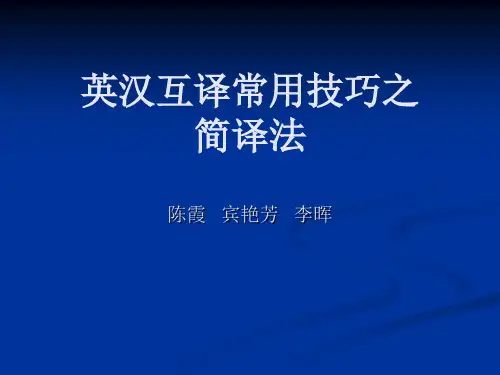
谢。
D·省略物主代词
EXAMPLES: 1)Her dark hair waved untidy across her broad
forehead ,her face was short ,her upper lip short ,showing a glint of teeth ,her brows were straight and dark ,her lashes long and dark ,her nose straight. 她的黑发蓬松地飘拂在宽宽的前额上,脸是短短的,上
3 She hid behind the door . 她藏在门后(behind不能省略) 4 His brother stood by the window. 他弟弟站在窗边(by不能省略)
谓语的省略
❖ 英语的谓语必须是动词,而汉语的谓语却可以是形 容词或其他词性,故英语中的动词特别是联系动词 可以省略不译。
appearance. 只有浅薄的人才会以貌取人。
省略连词
A省略并列连词and和or 1 Mr.Bingley was good-looking and
gentleman-like. 宾利先生相貌英俊,彬彬有礼。 2 Men and women ,old and young,all joinde
leader. 打蛇先打头,擒贼先擒王。
3)The significance of a man is not in what he attains but rather in what he longs to attains.
人生的意义不在于已获取的,而在于渴望获得什么 样的东西。
省译法
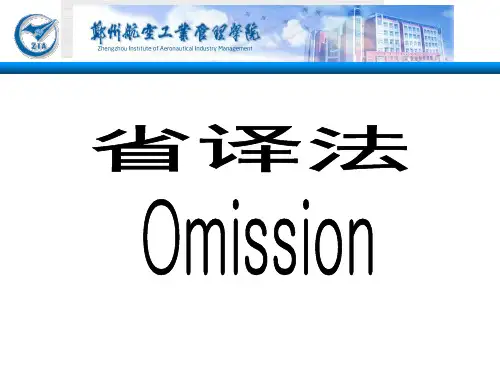
4、省略冠词
英语有冠词,汉语没有冠词;因此,英译 汉时往往要将冠词省略。相反,汉译英时,多 要增加冠词,也就是增译法中的增加冠词。 1). A book is useful. 书(是)有用(的)。 2). The earth goes around the sun. 地球绕太阳转。
3). A teacher should have patience in his work. 当教员的应当有耐心。(不定冠词A) 4). The girl standing at the window is his girlfriend. 站在窗口的(那个)女孩是他女朋友。 此句中girl后有定语,汉译时定冠词The 可省 也可保留。)
8. 正是呢!我一见了妹妹,一心都在他身上 了,又是喜欢,又是伤心,竟忘记了老祖 宗。该打,该打! ―Of course,‖ she said, ―I was so carried away by joy and sorrow at sight of my little cousin, I forgot our Old Ancestress. I deserve to be caned.‖ ―Yes, of course. It was just that seeing my little cousin here put everything else out of my mind. It made me want to laugh and cry all at the same time. I’ m afraid I quite forgot about you, Grannie dear. I deserve to be spanked, don’t I?‖
After-class work
英译汉翻译技巧省略法
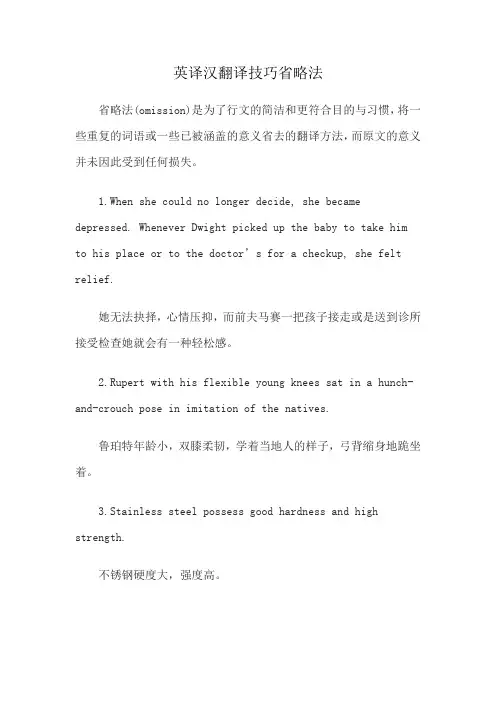
英译汉翻译技巧省略法省略法(omission)是为了行文的简洁和更符合目的与习惯,将一些重复的词语或一些已被涵盖的意义省去的翻译方法,而原文的意义并未因此受到任何损失。
1.When she could no longer decide, she became depressed. Whenever Dwight picked up the baby to take him to his place or to the doctor’s for a checkup, she felt relief.她无法抉择,心情压抑,而前夫马赛一把孩子接走或是送到诊所接受检查她就会有一种轻松感。
2.Rupert with his flexible young knees sat in a hunch-and-crouch pose in imitation of the natives.鲁珀特年龄小,双膝柔韧,学着当地人的样子,弓背缩身地跪坐着。
3.Stainless steel possess good hardness and high strength.不锈钢硬度大,强度高。
4.Penicillin works by not allowing a bacterium to build its cell wall.青霉素的作用是不让细菌制造细胞壁。
5. This is the solid rocky bottom under the ooze and mud of the ocean floor.海底软泥和泥层下面是坚硬的岩石层。
6. There is a 30% increase of our installed capacity with this year.今年,我们的装机容量增加了 30%。
7.在工作中,我们必须避免犯不必要的的错误。
We must avoid making mistakes in our work.8.质子带阳电,电子带阴电,而中子既不带阳电也不带阴电。
英语翻译之省略法
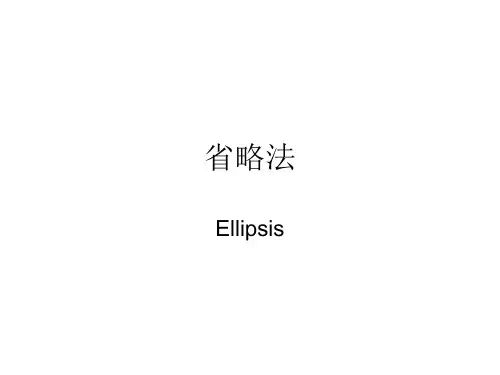
• 如果知道频率,就可以求出波长。 • 根据汉语习惯,某些用作宾语或同位语的反身代 词可省略不译。 • Why do we feel cooler when we fan ourselves? • 扇扇子时,我们为什么感到凉快些? • ⑸省译动词 • ①谓语动词的省译。 • 谓语动词,是英语句中必不可少的成分。汉语则 不然,句中可以没有动词而直接用形容词、名词 或词组作谓语。所以,有些英语谓语动词汉译时 可以不译出,句子反而更为通顺有力。(了解汉 语这个特点,汉译英时,可把某些汉语中的形容 词、名词或词组译成动词。)
• 从语法和修辞的角度看,省略有下列几种情况: • ⑴省译冠词 • 英语中冠词用得很多,汉语中却没有冠词。汉译英时要 注意加上名词前面的冠词,而英译汉时,冠词往往可以 省译。 • 例:The rate of a chemical reaction is proportional to the concentration of the reacting substance. • 化学反应的速度和反应物的浓度成正比。 • The basic function of the triode is as an amplifier. • 三极管的基本功能是作电流放大器。 • ⑵省译介词 • 英语中,词与词的关系通常是用介词来表示的。而汉语 中,词与词的关系是通过语序和逻辑关系
省略法
Ellipsis
• 词的省译 (The methods of omitting the word’s number) • 词的省译或叫省略法,指的是原文中的有些词, 译时不译出来。译文中虽无其词,但已有其意, 或是属于不言而喻,译出来反倒累赘或是违背译 文的语言习惯。省略译法的目的是为了使译文简 明扼要、通顺。要特别注意,省略法不是,也不 能删去其中的内容。 • ⒈ 英译汉时的省译
翻译中省略法的处理
考虑语境:在应用省略法时,需要考虑语境,确保省略后的文本在语境中 仍然能够理解。
保持原文风格原则
尊重原文的语言 风格和表达方式
保持原文的修辞 手法和情感色彩
避免过度翻译, 尽量保持原文的 简洁性和流畅性
0 1
作用:省略法 可以避免翻译 后的文本过于 冗长,提高阅 读体验。
0 2
应用范围:省 略法适用于各 种类型的文本, 包括文学、科 技、商业等领 域。
0 3
注意事项:在 使用省略法时, 需要注意保持 原文的意思和 逻辑,避免产 生误解。
0 4
省略法的分类
完全省略:省略整个句子或段落 部分省略:省略句子中的某些成分,如主语、谓语、宾语等 隐含省略:通过上下文暗示省略的内容 结构省略:省略句子中的某些结构,如连词、介词等
0
0
0
0
1
2
3
4
保留关键词,省略重复信息
识别关键词:找出句 子中的主要信息,保
留关键部分
省略重复信息:删除 重复出现的词汇或短
语,保持句子简洁
调整语序:根据目标 语言的语法规则,调
整句子结构
确保准确性:在省略 过程中,确保翻译的
准确性和完整性
05
翻译中省略法的注意事 项
注意文化差异
在翻译过程中,要注意不 同文化之间的差异,避免 因文化差异导致的误解和
翻译中省略法的处理
,a click to unlimited possibilities
汇报人:
目录 /目录
01
翻译中省略法 的概念
02
翻译中省略法 的应用
商务英语翻译—增词与省略
中国同世界各国各地区的经济技术交流与合作广泛 开展。 China has engaged in extensive economic and technological exchanges and cooperation with other countries and regions.
二、原文中表示范畴的词
We might not make any headway with your offer.
本公司接受贵公司的报盘,但要求贵公司把装运期提前两个月。
We accept your offer, but demand that you advance the shipment by two months.
话不说。
He shrugged his shoulders, shook his head, cast up his eyes, but said nothing.
4.增加连词或关系代词
汉语中的词,词组和句子之间的关系往往通过上下文或语序来表
示,较少用连词或关系代词.而英语通常需要用连词关系代词来表明
增词和减词
Amplification and Omission
一、增词法(Amplification)
增词(译)法就是指在翻译时按照句法上的需要在
译文中增加一些原文中虽无但有其意的词。 增译的目的是为了更加忠实通顺地表达原文的内容,
而决不是无中生有地随意增加。
1.增补主语
汉语里无主语的句子相当多,汉译英时 常常要根据上下文的意思选择适当的代 词或名词补出主语。
之间的逻辑关系.因此汉译英时增补的情况很多.例:
酒令智昏
物极必反
• When • Once
wine is in, wit is out.
英语翻译之省略法
• He declined to amplify on the President’s statement, since he had not read the text.
• 他没有看到总统讲话的文本,不愿意加以发挥. • If I had known it,I would not have joined in it.早知
• 众所周知,重量是地球作用在物体上的引力。
• ③强调句中的it,本身无词义,省译。 • 例 : It is a man’s social being that
determines his thinking. • 是人们的社会存在,决定人们的思想。
• ⑺同义词或近义词的省译
• 英语中,特别是科技英语中,有些同义词 或近义词连在一起用,或者表示强调,使 意思更加明确,或者表示一个名称的不同 说法。英译汉时,往往只译其中的一个, 或把意思综合起来译即可。
• 例:When heated, gases act in exactly the same way as liquid acts.
• 气体受热时所发生的变化与液体完全一样。
• 在实践中,动词省译还见于下列两种情况: • •某些系动词,如be, become, get等,如以形容
词或介词短语作表语时,这类动词常可省译。
• 化学反应的速度和反应物的浓度成正比。
• The basic function of the triode is as an amplifier. • 三极管的基本功能是作电流放大器。 • ⑵省译介词
• 英语中,词与词的关系通常是用介词来表示的。而汉语 中,词与词的关系是通过语序和逻辑关系
• 来表示。所以,英译汉时,许多介词可省略不译。 比如,表示时间、地点的介词,译成汉语时出现 在句首的可省译。
英汉互译常用技巧之 简译法 - 广西小学英语教师教育网
省略连词
A省略并列连词and和or
1 Mr.Bingley was good-looking and
gentleman-like. 宾利先生相貌英俊,彬彬有礼。 2 Men and women ,old and young,all joinde in the battle. 男女老少都参加了战斗
一个人年轻时懂得什么不大重要,重要的是懂得如 何学习。
C· 作宾语的代词往往也可省略
EXAMPLES: 1)The following letter will explain itself and needs no apology. 下面的话一看就明白,用不着道歉。 2)She laid her hand lightly on his arm as if to thank him for it. 她轻轻地把手放在他的胳膊上,好像表示感 谢。
省略介词
表示时间和地点的介词短语在被翻译成汉语的 时候,如果能够放在句首,介词往往可以省略; 如果只能放在句末,就不能省略。 1 On sundays we have no school. 周末我们不上学。 2 Smoking is prohibited in public pla: 1)Her dark hair waved untidy across her broad forehead ,her face was short ,her upper lip short ,showing a glint of teeth ,her brows were straight and dark ,her lashes long and dark ,her nose straight. 她的黑发蓬松地飘拂在宽宽的前额上,脸是短短的,上 唇也是短短的,露出一排亮亮的牙齿,眉毛又黑又直, 鼻子笔挺。
- 1、下载文档前请自行甄别文档内容的完整性,平台不提供额外的编辑、内容补充、找答案等附加服务。
- 2、"仅部分预览"的文档,不可在线预览部分如存在完整性等问题,可反馈申请退款(可完整预览的文档不适用该条件!)。
- 3、如文档侵犯您的权益,请联系客服反馈,我们会尽快为您处理(人工客服工作时间:9:00-18:30)。
英语翻译之词义省略法
一、从语法角度来看
(一)省代词
1.省略作主语的人称代词
(1)省略作主语的人称代词
I had many wonderful ideas, but I only put a few into practice.
我有很多美妙的想法,但是只把少数付诸实践了。
He was thin and haggard and he looked miserable.
他瘦弱憔悴,看上去一副可怜相。
(2)英语中,泛指人称代词作主语时,即使是作第一个主语,在汉语译文中往往也可以省略。
联展在线:/xkyfd/ 考研学习:/kcnet1450/
We live and learn.
活到老,学到老。
When will he arrive?—You can never tell.
他什么时候到?——说不准。
The significance of a man is not in what he attained but rather in what he longs to attain.
人生的意义不在于已经获取的,而在于渴望得到什么样的东西。
2.省略作宾语的代词
The more he tried to hide his mistakes, the more he revealed them.
他越是想要掩盖他的错误,就越是容易暴露。
Please take off the old picture and throw it away.
请把那张旧画取下来扔掉。
3.省略物主代词
I put my hand into my pocket.
我把手放进口袋。
She listened to me with her rounded eyes.
她睁大双眼,听我说话。
(二)代词it的省略
Outside it was pitch dark and it was raining cats and dogs.
外面一团漆黑,大雨倾盆。
He glanced at his watch; it was 7:15.
他一看表,是七点一刻了。
It took me a long time to reach the hospital.
我花了很长时间才到了医院。
It is the people who are really powerful.
人民才是最强大的。
(三)省略连接词
He looked gloomy and troubled.
他看上去有些忧愁不安。
(省略并列连接词)
As it is late, you had better go home.
时间不早了,你最好回家去吧。
(省略表示原因的连接词) If sinter comes, can spring be far behind?
冬天来了,春天还会远吗?(省略表示条件的连接词)
If I had known it, I would not have joined in to.
早知如此,我就不参加了。
(省略表示条件的连接词)
John rose gloomily as the train stopped, for he was thinking of his ailing mother.
火车停了,约翰郁郁地站了起来,因为他想起了病中的母亲。
(省略表示时间的连接词)
(四)省略冠词
1.英语有冠词,汉语没有冠词;因此,英译汉时往往可将冠词省略。
A teacher should have patience in his work.
当教员的应当有耐心。
(省略不定冠词A)
The horse is a useful animal.
马是有益的动物。
(省略定完词The)
It is out of the question to fly to the moon in the past.
在过去,飞往月球是绝对办不到的事情。
(省略定完词The)
The moon was slowly rising above the sea.
月亮慢慢从海上升起。
(省略定冠词The)
2.英译汉时,省略原文中的冠词是一般情况。
但在某些场合,冠词却不能省略,可以翻译为“一个,每一,这个,那个”等。
例如:
He left without saying a word.
他一句话不说就走了。
Egbert said he was getting a dollar a mile.
埃格伯特说,他(开车)每天一英里就赚一块钱。
This is the book you wanted.
这就是你要的那本书。
(五)省略介词
1.省略表示时间的前置词
The People’s Republic of China was founded in 1949.
一九四九年中华人民共和国成立。
比较:中华人民共和国成立于一九四九年。
(介词译成汉语在句首时可以省略,在句尾就没有省略)
On July 1, 1997, Hongkong returned to the People’s Republic of China.
一九九七年七月,香港回归了中华人民共和国。
2.省略表示地点的前置词
Smoking is prohibited in public places.
公共场所不准吸烟。
In winter, it is much colder in the North than it is in the South.
冬天,北方的天气比南方冷得多。
如:
He stood by the desk.
他站在桌旁。
I stayed in my brother’s house.
我住在弟弟家里。
(六)省略动词
When the pressure gets low, the boiling-point becomes low.
气压低,沸点就低。
Delivery must be effected within the time stated on the purchase order.
必须在购货单规定的时间交货。
二、从修辞角度看
(一)英语句子中有些短语重复出现,或者具有相同意义的词重复出现,英译汉时可按情况作适当省略。
University applicants who had worked at a job would receive preference over those who had not.
报考大学的人,有工作经验的优先录取。
Neither party shall cancel the contract without sufficient cause or reason.
双方均不得无故解除合同。
(二)根据汉语习惯,译文中可以省略一些可有可无的词。
There was no snow, the leaves were gone from the trees, the grass was dead.。
